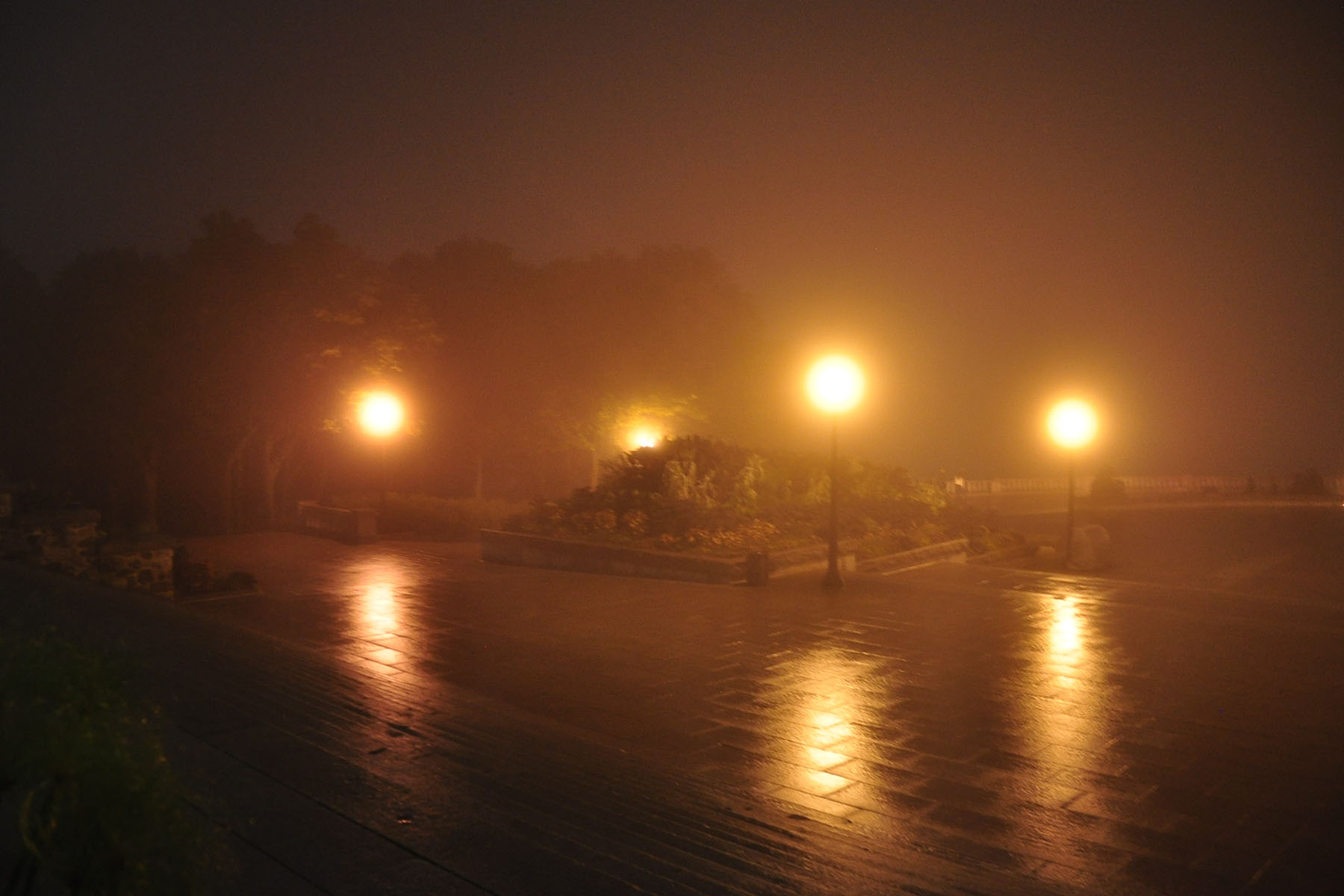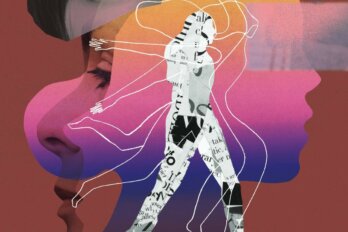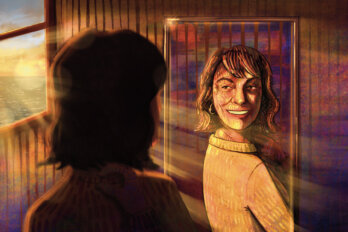MEMOIR
What Cruising Taught Me about Love
I found connection in hidden trails, the flicker of cigarette ends, and fleeting encounters
BY PETER DUBÉ
Published 6:30, JULY 26, 2024

When I was younger, I was hot for information and experience. These related hungers came together in unexpected and unpredictable ways in cruising. Such outings were among the most important moments of my life. The encounters with strangers, the kisses and fumbling with belts and trousers, never once felt abject to me. What those moments did feel like was as various and complex as the emotional and spiritual responses one might have to any other event. I learned a lot about myself, my feelings, desires, and boundaries. In cruising, I found an important part of my education. The claim is complicated, since the activity to which I’m referring has largely been displaced by the virtual: the web and its attendant apps. Consequently, some explanation is needed.
I found a truth in moonlight. Deep in the woods of Mount Royal was a tangle of paths and small clearings that saw scores of men gathering and become luminous at sundown, only to vanish with the returning light. Some nights, I joined them. Tracking the pale faces or flickering cigarette ends, I could walk for hours. The pleasure of being in nature was part of what stirred me, as was the fullness of the dark. It wasn’t total, but it was as close as I could get. Immersed in the quiet, I was able to silence the noise in my head. Those hours taught me much about patience, about being open to possibility—what might but didn’t have to happen.
Cruising has always been partly about seeking pleasure, and doing so in a way with no certain end point. One may start out wanting a sexual partner, but there is never a guarantee; thus it becomes a mixture of anticipation, delight, and idleness. I found ways to sideline my restless expectations. This led me to an awareness of the dangers of overdetermining, of freezing meaning rather than letting it arise. Some encounters were extraordinary, some were not, and some even felt unsatisfying, but the experience of cruising never failed to please.
What did I learn? I learned how the need to see validation in another person’s eyes is universal; how kindness brings light into the world; how the smallest gesture, whether noble or cruel, can have unforeseeable consequences. I learned how, despite all the heteronormative narratives of romance, it was utterly true that one could love someone passionately, deeply, for twenty minutes without knowing anything about him, or seeing him again, and treasure the memory of those minutes all of one’s life.
I don’t want to suggest that cruising was utopian. I saw a lot of nasty rejections and screaming matches, and knew people who were gay-bashed, some of them friends, lovers, or acquaintances. Though I managed to escape actual violence, I had my share of unpleasant encounters and hurtful comments and even a little dust-up. But those things are not what lingers. They are part of the deep education I began acquiring at the time and still build on. I learned how to take chances intelligently, how to both protect myself and open myself up; how to speak truth gently when I had to, and how to say “no” firmly but without cruelty. And I learned how to hear those things clearly too. I learned about my pleasures, my dreams, my fears, and what was possible to construct from them.
It was in the bushes that I began the hard work of abandoning shame, the shame with which every gay boy I knew grew up: the terrible sense that one is wrong in some fundamental way. Reading and debating began that process for me, but cruising did the heavy lifting. I discovered the luxuriance and variety of desire; I saw the numberless permutations of sex and learned that no matter what someone might be into, there were guys out there who shared that interest, who were able to give a partner what he needed.
The inexhaustible variety of desire on display transformed me. It demonstrated that there was nothing abnormal in the consensual riot of adult human sexuality. The men on the mountain didn’t hide their desires—to do so was all but impossible. Each of them was there, eager and dressed or undressed, to signal his appetite. One might be stumbled upon on the trails, even in medias res, and lots of guys liked to watch, usually from a respectful distance, though there was the occasional annoyance. I remember one time I was happily engrossed with a guy and realized only when we briefly broke our embrace that an audience had gathered, anticipating something. Suffice it to say your relationship to shame changes after a small crowd has observed you starting to get busy, as does your understanding of intimacy.
In that tangle of trees and sky, earth and breath, I came to one of my life’s foundational intuitions: a vision of eros, desire, passionate life, as a force churning through and animating the world itself. The issue of watching and being watched also brings up another revelation I came to on the trails: the power of the gaze.
This insight began to emerge during my first visits to New York City. I was nineteen or so, but I’d already been out for a few years. I had a keen sense of what I wanted to explore in the metropolis. High on the list were bookstores and the great museums, but my itinerary included legendary leather bars too. Within hours of my arrival in Manhattan, I discovered Times Square and the porn theatres that lurked among its crowds.
I vividly recall entering one of those cinemas for the first time. Inside, it was darker than I’d expected; the lobby, corridors, and other blank spaces were lit dimly and obliquely. This served to magnify another unexpected thing: the theatre was bigger than I’d anticipated. On either side of the vestibule, staircases led to a balcony and a mezzanine that housed curtained alcoves of unclear purpose; thus the ceiling seemed impossibly high on entering. Sounds echoed slightly as they arose, even the pad of my footsteps, and as soon as I entered, I saw the doors to the screening room: a second threshold, another passage, centred on the wall opposite the entry.
Beyond those doors, the auditorium was dominated by a luminous screen across which paraded a nation of beautiful men, naked or partly clothed, all utterly splendid. I caught my breath on walking in; it was the first time I’d ever seen a movie like that: a dirty movie meant for men like me, meant to arouse us and not straight guys. The impact was so great I can still remember something of the feature’s “plot,” if that’s the right word. It turned around a pair of truckers, hyperbolically masculine guys, looking for work and finding some comfort in each other and a number of other men. The film showed them with a woman in one scene, giving me another first insight, a sense of the subtle complexities of men’s sexuality: the permeability of categories.
However, what had the strongest impact was not the film but the men watching—and not watching. Some of them, it seemed to me at the time, could have stepped off the screen; some were hot, some were butch, all were taciturn, and they were at it, though it took me a moment to make that out, blinded as I was by the contrast of the heavy shadow and the projector’s beam. As I stood near the back of the room, I had my first meeting: a face and bare chest, revealed through an unbuttoned shirt, heaved into my vision from some dark corner, glowing with spectral light. He approached, his gaze running over me so directly that it intimidated even as it aroused; he passed by, his hand grazing my hip almost imperceptibly, and vanished into the dark again, throwing me a backwards glance.
Of course I followed, moving down the aisle only to lose him as my eyes struggled to adjust. Once they did, I saw more. Among the seats, hazy shapes moved through pools of dark and shafts of light. T-shirts were pulled off, heads rose and fell. The sunlight and the sidewalks had no dominion here. This was the kingdom of fornication.
Iwould spend hours in those porn theatres, as I did in the nighttime park, putting what I’d learned into practice. I would need patience to tough out those hours: observing, enjoying, and learning. Just as I would every time I went cruising anywhere. And the hours were as transformed as they were transformative, because cruising recast time for me, or at least the experience of it, through the play of intention and emotion, of the needs of my body and the needs of the crowd at once.
In those privileged spaces, time changed—flexed and expanded, or contracted, or moved sideways. An embrace can seem to go on endlessly, everything else fading from consciousness. The ticking of seconds, minutes, hours is the sheerest effervescence—or is lead. The time spent watching men could seem all too brief in its hotness, or interminable if one began to find it dull. Moreover, cruising spaces almost invariably feature no clocks, so the only measure of time is one’s own body, its pleasures, or the moon sailing overhead.
I began to learn something about community in these spaces too—its strengths and weaknesses, and most importantly its possibilities and range. I went cruising, certainly, to meet people, people with whom to have sex. These were people I didn’t know, but they were also, I assumed, people like me—that is, other gay guys. Cruising, however, showed me the question was far more complicated. I quickly learned that queer men were diverse and not all of them were like me, or for me. I came to understand that my peers were more than merely gay. Samuel R. Delany notes, in his magisterial Time Square Red, Times Square Blue, that one of the important, and often unacknowledged, significances of cruising is the way it facilitates cross-class contact, how it allows people who might not meet in other circumstances to do so.
It is able to do this because cruising grounds are not socially sanctioned spaces. Lacking sanction means that they are not for a particular kind of person, since more often than not it is sanction, meaning a kind of discipline or regulation, that establishes such boundaries. Such cross-category contact is no small thing; its benefits are clear on the face of it, particularly since the contemporary world is so busy homogenizing communities and creating echo chambers of thought and discourse for us all to inhabit.
Delany’s observation certainly holds true for me. I met an incalculable variety of people. My encounters were unnamed often enough, but there were many murmured conversations too—with academics and artists, CFOs and contractors, the unemployed and entrepreneurs, demimondaines and designers, petty criminals and petit bourgeois, fathers of both sorts—and I oftentimes found them charming.
Thus, I began to learn how to talk to people across spaces of class, education, and other social categories. I learned that people can be both like me and terribly different. It also became obvious that, among the qualities I looked for when cruising, a concern with pleasure became central. I still like people who prioritize and cultivate pleasure, of all sorts. Time with them always turns around making each other happy. In these spaces, I discovered something about the mutability of identity too. A lot of the men I hooked up with said they “weren’t gay,” they just liked to have sex with guys. And who was I to tell them they were wrong? I accepted them at their word, although I knew beyond doubt that I was gay, because I wanted more from men than just sex. And I knew that places like these had greater import for me than the sex found there.
This cross-category contact was complex, so when I say I began to learn to “talk,” I mean it in a very broad sense. I learned to communicate. The fine distinction matters here and brings me back to the question of the gaze I raised before, because cruising grounds are often hushed spaces. Conversations are brief and/or whispered, while entire narratives can fill the deliberate glance. The gaze and its power matter when cruising, and cruisers must master techniques of looking and being looked at, of seeing and being seen, and—given the obvious difficulties of some cruising grounds—not being seen. The double vision of the self as both subject and object shaped me in ways I am only beginning to understand.
Cruising nourished much in me: an appreciation for posture and gesture, an eye for detail, a sense of how to present the self, and an ever-deepening respect for ambiguity. Nuance is inevitable in this process, because cruisers have a paradoxical agenda; they must let others know they want sex without looking like they need it too bad (desperation is never sexy). They must look hot and cool at once. Putting such equivocal images and energy out there takes phenomenological agility and hermeneutic refinement. I understood that when a man’s gaze crosses mine and seems as if it might lock but then skitters away, that means something.
In the woods of the mountain and in the darkened halls of theatres, these kinds of ephemeral exchanges were magnified. Wordless promises were made and honoured, conversations of hand, lips, and glance passed from one man to another. And yes, the murmured phrase or obscenity was in the mix too, happily, but for once in my young life, a facility with language wasn’t going to get me to my goal all on its own. Thus—the occasional and inevitable failure aside—the eloquent bodies of men somehow worked out what would happen and who would do what precisely to and for whom. It was sorcery, and I loved it.
I had no trouble bending some of these skills to other of life’s ends too. Knowing a trick or two about projecting both confidence and interest can help with many things. These were among the ways I learned whatever I have come to know about negotiation, about getting what I need and giving someone else what they need; however haltingly, I found my way to a certain honesty, to speaking my truth and trying to understand someone else’s truth.
This, for me, is one import of Nietzsche’s dictum that “the degree and kind of a man’s sexuality reach up into the ultimate pinnacle of his spirit.” There is a spiritual valence to cruising—something beyond the circling round and checking out the scene. Although one might cruise to get laid, many cruisers would acknowledge there is pleasure even in the act of cruising, regardless of the outcomes. I found something analogous to meditation in it; the repetitive walking in dim light leaves one with one’s self, obliges one to consider one’s thoughts and feelings as they rise and fall.
Driven by desire, the cruiser encounters himself and the world: the world in the form of other men, physical space, or nature. And he encounters them not with the aim of extracting economic or social value but for enjoyment. Law and religion, culture and family, expend enormous effort to discipline pleasure, to validate one form as “good” and the other “bad.” Cruising confronts such questions, asking why the one and not the other. Why marginalize one aspect of human experience from everything else?
Cruisers also reclaim public space, assert their right to make use of it for ends that are meaningful to them, and in doing so make an argument that such aims might be of interest to others. If parks are made for the enjoyment of the public, who dictates what enjoyments are legitimate in that space, or which people have a right to use it, and which ways are authorized? And why? Nor are arguments about people having a right to not be forced to see things they are uncomfortable with pertinent. Who, after all, could possibly stumble upon two men in a clinch deep in the bushes and the night unless they deliberately sought them out?
Cruising grounds can be difficult to access; certainly, climbing even the moderate hill that led to the trails in the dark of night required both effort and commitment. Cruisers’ concern with visibility, with gaze and response, is the best possible guarantee that the uninterested and uninitiated are rarely going to be aware of when and where gay men gather to enjoy each other.
My experience of of such cruising began to make something of enormous significance clear: gay men were constructing—in the blank spaces in the city, and largely in utter silence—a new culture. A culture of pleasure and desire. And now, sadly, this world is vanishing.
This essay is at least partly an attempt to preserve it. If cruising, like every human project, was flawed and sometimes dangerous or problematic, it was at least, and could be again, an attempt at more: more pleasure, more joy, more contact, more freedom than is currently accessible to us. It was an effort to construct a social ecology with room for different uses of the city, different possibilities of experience, and an understanding of how communities with diverse interests and practices might learn to coexist. That is a vision worth preserving.
This vision took on an especially vivid form on one of my last visits to the mountain, a visit that took place shortly before the AIDS epidemic hit hard and began to empty the space of its devotees. It was night, and I was walking through the tangle of paths and came to a clearing; it was small and flat and unoccupied by any men. But at the centre of it was a small red fox, part of the hidden world of urban wildlife, or one of the animal spirits animating legends in so many cultures, taking in the marvel of human desire.
When I stepped into the moonlight, the fox’s head came up and assessed me with glowing eyes, measuring his options. I hesitated briefly, and he took shelter in some bushes through which I could still make out his shape. I walked through the clearing and into the path on the far side. Just as I moved forward, the fox came out of the brush and followed me. Soon he passed me and made his way into the woods. For a moment I could see him look around, then back at me, before vanishing: a cruise, I joked to myself.
I left him to his quest and went on with mine, though now I had some different ideas about what I was questing for. Regardless, the park, and the city, were big enough for both of us, big enough for everyone.



